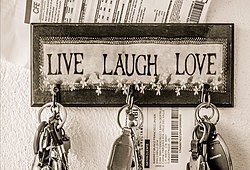Live, Laugh, Love
Topic: Philosophy
 From HandWiki - Reading time: 3 min
From HandWiki - Reading time: 3 min

"Live, Laugh, Love" is a motivational three-word phrase that became a popular slogan on motivational posters and home decor in the late 2000s and early 2010s. By extension, the saying has also become pejoratively associated with a style of "basic" Generation X[1] decor and with what Vice described as "speaking-to-the-manager shallowness".[2]
The phrase is an abridged form[3] of the 1904 poem "Success" by Bessie Anderson Stanley which begins:
He achieved success who has lived well, laughed often, and loved much
This phrase was subsequently popularized by Ann Landers[failed verification] and a 1990 Dear Abby column, where it was misattributed to Ralph Waldo Emerson.[3][4]
Other usages
A similar phrase appears as a lyric in the 1926 song "When the Red, Red Robin", most famously recorded by singer, actor, and vaudevillian Al Jolson:[5]
Wake up, wake up you sleepy head,
Get up, get up, get out of bed,
Cheer up, cheer up, the sun is red,
Live, love, laugh and be happy
Another similar wording appears in James Joyce's 1939 novel Finnegans Wake:
They lived und laughed ant loved end left.[6]
A Campaign Address at Boston, Massachusetts by Franklin D. Roosevelt on October 30, 1940, concludes with:
We are free to live and love and laugh.[7]
A 1979 episode of The Love Boat features a female character explaining her philosophy of getting through her troubled marriage as: "I'm here to live, love and laugh, or words to that effect!"[8]
A similar phrase is used in the poem "The Villa" published in the June 1854 issue of Blackwood's Magazine, attributed to "Trevor":
Shall saints not be? The saints shall rule the world;
Sit upon thrones—be ministers and kings;
Teach in the highways ; shake glad hands among
The fairs, and marketplaces; laugh, love, live;
Be all with all men until all be saints.[9]
2010s merchandise

"Live, Laugh, Love" and variants on the phrase have appeared on framed posters, wall decals, ornaments, cushions, mugs, bed linen, jewellery and even on coffins.[3][4] The Live Love Laugh Foundation, a mental health organization in India founded by Deepika Padukone, takes its name from the phrase.
Vice noted that the trend had largely passed by 2020.[2] Google Trends shows that searches for the phrase peaked between 2009 and 2014 in the United States, falling in popularity since then.[10]
See also
- Keep Calm and Carry On, another motivational phrase that became popular around the same time.
References
- ↑ "'Live, Laugh, Love': The Most Crushing Gen Z Insult, Explained - the Pollack Group". https://www.pollackgroup.com/red-all-about-it/live-laugh-love-the-most-crushing-gen-z-insult-explained.
- ↑ 2.0 2.1 Tate, Amelia (June 9, 2020). "'Live, Laugh, Love' Mums Defend the Much-Maligned Decor Trend". https://www.vice.com/en/article/ep4xwn/live-laugh-love-mums-defend-decor-trend. Retrieved April 16, 2021.
- ↑ 3.0 3.1 3.2 Dyas, Brie (July 7, 2017). "This Is the Origin of "Live, Laugh, Love"". https://www.housebeautiful.com/lifestyle/a7206/where-did-live-love-laugh-come-from/. Retrieved April 16, 2021.
- ↑ 4.0 4.1 Barrett, Jessica (April 9, 2019). "A Deep Dive Into How 'Live, Laugh, Love' Infiltrated Our Homes". https://www.refinery29.com/en-gb/live-laugh-love-origin. Retrieved April 16, 2021.
- ↑ "'HISTORIC SHEET MUSIC COLLECTION - When the Red Red, Robin Comes Bob, Bob, Bobbin' Along". https://digitalcommons.conncoll.edu/sheetmusic/1845/.
- ↑ Pierce, David (22 July 2014) (in en). Reading Joyce. Routledge. p. 146. ISBN 978-1-317-86507-0. https://books.google.com/books?id=Cl8SBAAAQBAJ. Retrieved March 22, 2023.
- ↑ "Campaign Address at Boston, Massachusetts | The American Presidency Project". https://www.presidency.ucsb.edu/documents/campaign-address-boston-massachusetts.
- ↑ "Gopher's Greatest Hits/The Vacation/One Rose a Day". https://www.imdb.com/title/tt0636670/?ref_=ttep_ep6. Retrieved April 26, 2023.
- ↑ Trevor (1854). "The Villa". Blackwood's Edinburgh Magazine 75 (June): 687–. https://archive.org/details/blackwoodsedinb253unkngoog/page/696/. Retrieved 2023-06-12.
- ↑ "live laugh love – Explore – Google Trends". https://trends.google.com/trends/explore?date=all&geo=US&q=live%20laugh%20love. Retrieved April 16, 2021.
 |
 KSF
KSF